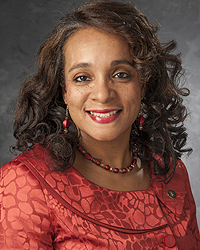There may be more to come at a later date.
The five-trustee majority also voted to rename Henry Grady, Richard Dowling and Thomas “Stonewall” Jackson middle schools and Robert E. Lee High School.
Now, a committee at each school, including a teacher, student, parent and alumnus, will be charged with proposing a new name to the district administration. The policy then calls for the superintendent to make recommendations to the board for a vote – expected to take place in May, according to the meeting agenda.
[Outgoing Board President Rhonda] Skillern-Jones had included eight schools on the renaming list, but trustees agreed to remove four – Lanier and Johnston middle schools and Davis and Reagan high schools – to allow for more discussion.
[New Trustee Jolanda] Jones, who represents Lanier, posted Wednesday on Twitter that she supported changing the school’s name. However, on Thursday she proposed removing the campus from the immediate renaming list to host a meeting at the school.
“Sidney Lanier was a confederate soldier despite what some say,” Jones posted on social media. “I would vote 2 change an anti-Semitic name if asked 2.”
Numerous parents and students from Lanier dressed in the school’s purple color and urged the board to keep the name. Sidney Lanier, they said, is better known as a poet than as a soldier in the Confederate army.
“This is clearly a very important question, and it brings out a lot of emotion on both sides of the issue,” Adriane Arnold, president of the Lanier parent group, told the board. “It is something our kids will be discussing at Lanier moving forward.”
Trustee Harvin Moore tried to postpone the renaming item “indefinitely,” but it failed on a 4-5 vote. He and Eastman said their votes on the board-driven items were not statements on the merits but on the process.
“I don’t think my vote represents pro-celebration of the Confederacy at all,” Eastman said.
Skillern-Jones backed the idea of renaming schools after the shooting deaths of nine black church worshippers in Charleston, S.C.
Skillern-Jones, who is black, said later that her colleagues should not have been surprised that she packed the agenda.
“I decided to stop listening to all the reasons why we can kick the can down the road and become more proactive about stopping that inequity that has persisted in this district since I came here in kindergarten,” she said.
See here, here, and here for some background. Skillern-Jones discussed her plans to push this issue in the interview she did with me last year; she described it as something she was proud to do. The specific list of schools to be renamed generated a lot of discussion, mostly having to do with Sidney Lanier. Texas Monthly wrote a piece sympathetic to Lanier, mostly expressing the viewpoint of former Lanier teacher and champion debate coach Jim Henley. Henley and Mike Bordelon, writing in Gray Matters, expanded on that. Andrea Greer pushed back. I support the overall move to rename these schools, though I’m still thinking about the Lanier case, but I will note two things. One, having a school named for oneself is a privilege, not a right. Two, however one feels about the particulars, having this discussion has been a very good thing. I’ve sure learned a lot from it. It’s easy to go through life without giving much if any thought as to why certain places are named the way they are, and what those names may mean to people. I know this because I’ve done it. Talking about these names, and hearing about what others think about them, has been enlightening, to say the least. If this conversation and the possibility of changing some names makes anyone uncomfortable or upset, consider that not talking about it and leaving things as they are because no one is interested in talking about it also makes people uncomfortable and upset. The Press has more.


So what is the argument for keeping Jefferson Davis high school? Is there some legitimate discussion about that? (I’m confident someone on this blog will let me have it).